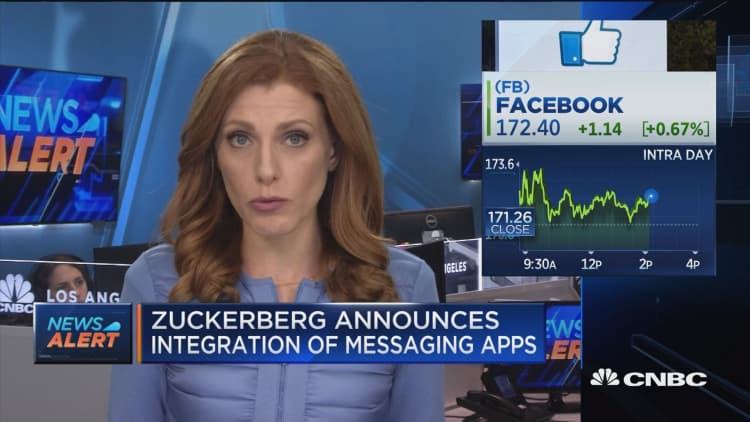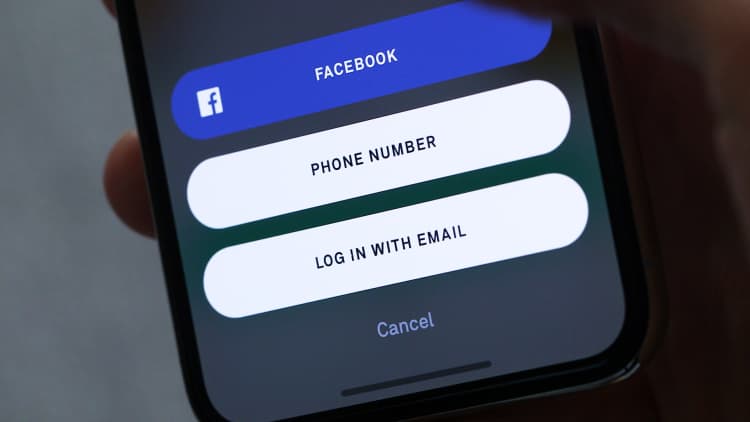On Dec. 19, David Heinemeier Hansson quit Facebook and Instagram. It was a decision he made alongside his business partners at software company Basecamp.
"We've decided to become a Facebook-Free Business at @basecamp starting today," Hansson, a prominent programmer with over 300,000 Twitter followers, wrote in a tweet. "No Facebook, Instagram, no WhatsApp. No ads. No profiles. No pages. No usage. No more."
Basecamp, which develops productivity apps, deleted all of its Facebook-owned accounts. On Instagram, Hansson removed most of his posts, saying goodbye to his 34,000 followers. To lure other companies, the Chicago-based company started promoting the hashtag #FacebookFree.
CNBC spoke with a handful of other companies that have similarly stopped paying for Facebook and Instagram ads since the start of last year. Some said they quit due to concerns related to Facebook's privacy policies, while others said they've become fed up with the unpredictability in how Facebook applies its ad policies.
Facebook's data-sharing snafus, privacy issues and public relations disasters were the story of 2018. But despite a year in crisis, the company's financials have held up just fine. Net income jumped 61 percent in the fourth quarter and 39 percent for the full year, while revenue last year surged 37 percent to $55.8 billion.
Investors are showing their forgiveness, sending the shares up 31 percent so far this year, though the stock is still well off its record high reached in July. Daily active users rose 9 percent in the fourth quarter from a year earlier to 1.52 billion. And eMarketer sees Facebook actually picking up some market share this year in the U.S., capturing 22.1 percent of digital ad spending, up from 21.8 percent in 2018.
But one of Facebook's main risks going forward is that Hansson's viewpoint gains significant traction and users start turning off the social network in bigger numbers. Advertisers may or may not leave out of principle, but they would certainly be more inclined to turn elsewhere if there's an exodus of Facebook users.
"Facebook has a frankly despicable business model that's predicated on violating people's privacy and running an ad monopoly," Hansson said in an interview. "I think more people and more businesses should vote with their presence, vote with their ad dollars and consider what they want more of in this world. Our conclusion was we would like less Facebook."
Basecamp spent more than $100,000 on Facebook ads in 2017.
After Hansson's tweet, Ben Fox, the CEO of User Camp, voiced his concerns. Fox, whose company also makes productivity software, already deleted his Facebook accounts last year after revelations in March that data firm Cambridge Analytica had improperly accessed user data, potentially to influence the outcome of the 2016 U.S. presidential elections.
Reports in The Guardian and The New York Times initially indicated that 50 million Facebook profiles were harvested for Cambridge Analytica, a number that was later revised to as many as 87 million Facebook profiles.
"That made me realize that as far as I can tell they don't seem to have an internal moral compass besides doing what they're required to by law," Fox said. "The least I can do is just not give them any money."
User Camp pushed the thousands of dollars a year it had been spending on Facebook ads to different places. It's now doing more marketing with contextual ads, which appear when people are looking for relevant products, and has had success with email marketing.
"We didn't seem to suffer too much by it, and we haven't heard from our customers either, which gave us a feeling of freedom," Fox said. "We're just talking to users over emails like it's the '90s."

Losing a Basecamp here and a User Camp there won't hurt Facebook, which has become a default advertising channel for companies of all sizes. But small businesses as a whole are very important, making up about 50 percent of Facebook's total advertising revenue, according to multiple former employees with knowledge of the company's finances. They asked not to be named because those numbers are confidential.
"These are businesses that are reaching audiences they want to reach," said Sheryl Sandberg, Facebook's operating chief, at a conference in San Francisco in February. "If you're a small business, you can't buy a TV ad even in a city and you can't put up a billboard and you can't buy a big newspaper banner. It's really the democratization of access that that technology allows."
A Facebook spokesperson told CNBC in a statement that the company is making changes, though nothing specific was mentioned.
"We know we have more work to do to regain people's trust, and we're making significant changes to the way we run our company," the spokesperson said. The company has over 7 million advertisers a month, so "there's always some expected churn. But we haven't seen a meaningful trend in advertisers' pulling spend," the statement said.
Separately on Wednesday, CEO Mark Zuckerberg published a 3,000-word post, laying out his vision for "privacy-focused" social networking and the shift to "private, encrypted services."
LegalAdvice.com, a New York-based legal expert service run by attorneys and brothers David and Matthew Reischer, stopped buying Facebook ads last April, after previously spending $10,000 to 15,000 a year on them. Like User Camp, the brothers were offended by the Cambridge Analytica story.
"The whole Cambridge Analytica thing was a big turnoff for me," David Reischer said. "I care about privacy, and I thought that was disgusting what they did. We said, 'Let's no longer run Facebook ads for a while.' I think a lot of people like me are going to sit on our hands and not spend our money with them until they change their privacy policy."
It's not just small software companies and mom-and-pop shops.
Mozilla, the creator of the Firefox browser, has made a significant change in its ad budget amid the Facebook fallout. Mozilla, which competes with Google, Microsoft and Apple in the web browser market, recognized a disconnect in the way Facebook treats user data and the expectations those users have for their data, said Mozilla Chief Marketing Officer Jascha Kaykas-Wolff.
Kaykas-Wolff said Mozilla had a seven-figure budget with Facebook and he hopes to use its advertising channels again, but that won't happen until there are "significant and systemic changes in the way Facebook treats its customers."
Mozilla has turned to other internet sites for advertising and has been hosting regionally focused offline events.
"I'm happy to say the performance of our organization didn't wane based on our decision," Kaykas-Wolff said. "When we made the decision, we knew we'd have to work harder because Facebook had been a high-performing channel."
Other companies say they're leaving Facebook because the targeted ads aren't working as well anymore or because of problems in how Facebook determines and communicates what's acceptable.
Approyo, which hosts and manages SAP software for its clients, stopped advertising on Facebook last year and moved more of its budget to Google after growing discontent with the performance of the targeted ads it ran on the social network.
Approyo CEO Christopher Carter estimates his company, which is based in Wisconsin, had been spending "a couple thousand dollars a month on Facebook." Because his business provides niche services for a more technical audience, it's also focused on creating content to share with followers on Twitter and LinkedIn.
"We don't have any advertisements on any of Facebook's properties at this time and, to be honest, I haven't even had them evaluated in 2019," Carter said. The scandals certainly haven't helped. "It resonates in the back of my mind that this company is not trustworthy, and I just don't want to do business with them," he said.

'Never give them a penny'
Inforce, a maker of flashlights, including some that can be mounted onto rifles and handguns, is an unusual case. Facebook has specific policies regarding "weapons, ammunition, or explosives," but the company allows ads for "mounted flashlights for firearms" as long as the minimum audience age for seeing the ads is set to 18.
Inforce determined that its products were compliant.
"We understand how Facebook works, what they want and how to fall within their guidelines," said Matthew Wolfe, vice president of Inforce.
But Facebook has often blocked the ads anyway, costing Inforce $25,000 to $30,000 each time, after accounting for equipment rentals and the production costs of videos, Wolfe said. Inforce's last Facebook ad was set to go online in mid-2018, but that too was blocked. Wolfe said the company appealed the decision 14 times before Facebook ultimately shut down its advertising account.
Ultimately, Inforce's marketing agency was able to get the account reinstated, but the company had decided to move on, turning its six-figure budget to more grassroots efforts.
"I would never give them a penny ever again," said Wolfe. "That money went in a different direction — completely different direction."
WATCH: Here's how to see which apps have access to your Facebook data — and cut them off



